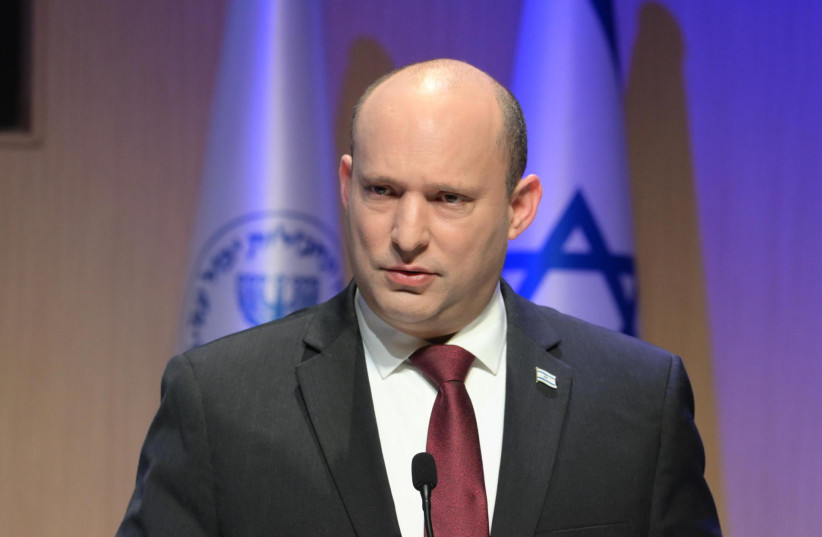Israel now is a serious world player, with that, however, comes serious responsibility.
By HERB KEINON Published: MARCH 5, 2022 21:35
Updated: MARCH 5, 2022 21:43
Prime Minister Naftali Bennett speaks at the Mossad, March 1, 2021 (photo credit: AMOS BEN-GERSHOM/GPO)
What Maccabi Tel Aviv did in 1977 after defeating CSKA Moscow and leading Israel to the FIBA European Champions Cup, Prime Minister Naftali Bennett did Saturday with his dramatic meeting in the Kremlin with Russian President Vladimir Putin: put Israel on the map.
“We are on the map! And we are staying on the map – not only in sports, but in everything,” Israel-American basketball star Tal Brody, in heavily accented Hebrew, said in an emotional interview after the victory over CSKA Moscow, a remark that has become iconic.
By flying to Moscow on Saturday Bennett put Israel on the map in terms of international diplomacy. That he made the trip on Shabbat, unheard of for Israeli politicians, even more so for one who is Shabbat-observant, underlined the life-and-death urgency of the trip.
Just weeks after Amnesty International called Israel an apartheid state in an effort to isolate the Jewish state and turn it into a pariah, Bennett shows up in Moscow in what on the surface seems an attempt at mediating the Russian-Ukrainian crisis.
Rather than being a pariah, Israel — it is turning out — is a necessary mediator in one of the most severe crises the world has seen in decades.
Bennett’s trip was reportedly coordinated with Washington, Berlin and Paris, who all encouraged it. And it was also done with the knowledge of the Ukrainians, whose President Volodymyr Zelensky has been critical of Bennett and the Israeli government for not having taken a more forceful position against the Russians
But it seems that Jerusalem’s measured approach — balancing a real concern for Israel’s interests in maintaining good relations with Russia because of Moscow’s control of Syria’s skies with humanitarian concerns for Ukrainians caught in the fighting — has paid dividends.
It is Bennett that Putin agreed to see in Moscow, not France’s Emmanuel Macron, not Germany’s Chancellor Olaf Scholz, nor the prime ministers of other countries that traditionally play the role of mediator: Norway and Switzerland.
Rather Israel, little Israel.
That Bennett has been thrust into the role proves perhaps more than anything else the strides this country has taken on the international stage over the last two decades.
More than anything else in recent memory, the spectacle of Israel mediating a world crisis of this dimension shows the degree to which this country really is no longer your grandmother’s Israel.
Add to this the Walla report last week that the US asked Israel to lobby the United Arab Emirates to vote for a UN resolution condemning Russia’s invasion of Ukraine, after the UAE — a temporary member of the Security Council — abstained in a similar resolution on the matter in the Security Council.
Think about that for a minute and use it as a measuring stick to gauge how things have changed regarding Israel and the Mideast: The US turned to Israel to lobby the UAE to vote with it in the UN.
Israel now is a serious world player. With that, however, comes serious responsibility.
A mediator’s role is not always a glamorous one. Not every mediator ends up with a Nobel Peace Prize. Playing this role runs the risk of antagonizing one side of the conflict or the other — or both — something that could end up coming back to haunt Israel.
At the same time, however, it affords a degree of international prestige that could be leveraged for the country’s benefit down the line.
For instance, if Israel can serve a useful role here, it may be in a stronger position to make certain requests of those countries who turned to it for help in this crisis — the US, Germany and France — regarding the Iranian nuclear agreement that may, or may not, be concluded this week.
In the Russian-Ukrainian war, however, it seems as if more than Israel wanted this role of mediator, it was pushed into it.
It was pushed into it by the West, which because of its sanctions and its rhetoric has lost its ability to serve as an honest broker with Putin; and it was pushed into it by public opinion, both domestic and international, baffled that Israel — with its unique history — has not taken a more assertive role in the crisis.
Jerusalem, it seems, would have liked to sit on the fence in this crisis as many other countries in the region who share Israel’s fear of Iran and dependency on Russian regional goodwill have done — such as the UAE, Saudi Arabia, Egypt, Jordan and others.
Circumstances, however, made that impossible. So on Saturday morning Bennett stepped into the breach and flew to Moscow at a moment that for Israel is pregnant with great risks as well as historic possibilities.
Content retrieved from: https://www.jpost.com/international/article-700429.
